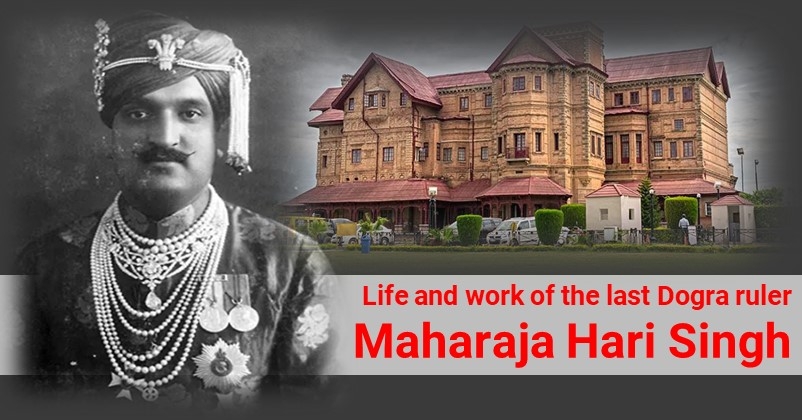Maharaja Hari Singh: From Abolishing Child-Marriage to Assection With India
| 15-Sep-2020 |

Maharaja Hari Singh was the last Dogra ruler of the erstwhile princely state of Jammu and Kashmir. His reign lasted for 22 years from 1925 until the accession of the state with the Union of India on 26th October 1947. The Maharaja had made noteworthy contributions for the betterment of his subjects like abolishing child marriage, making primary education compulsory and even raised his voice against caste-system. So, let us have a close look at his life and work in the following extract.
Hari Singh was born in Jammu in 1895, he was the son of Raja Amar Singh the brother of Maharaja Pratap Singh. He joined the Mayo College, Ajmer in 1908 at the age of 13. Later he was sent to Dehradun for military training. On his return, he was appointed the Commander-in-Chief of the State forces in 1915 when he was only 20 years old. He took up the post of senior member of the then State Council in 1922.
He ascended the throne in September 1925 but the Raj Tilak ceremony was performed in February 1926 at Jammu. After ascending the throne, he announced agricultural reforms and further extension of educational and other facilities. Though he had a rough time during his rule which he faced bravely but the most turbulent period he faced was in 1947 after the partition.
Maharaja Hari Singh introduced many administrative and judicial reforms. At the very first durbar of 1925, he had declared: “Justice is my religion.” He stuck to this secular vision in letter and spirit all his life. He selected the ablest and experienced luminaries from British India as his prime ministers. He set up a responsible government with full provincial autonomy, and a Board of Judicial Advisors with the ruler as the constitutional head. The finances of the State were governed on modern principles. He promoted diverse cultural activities of the state and patronised performing artistes.
Maharaja Hari Singh had worked hard for improving the lot of the Kashmiri Muslims. He made primary education compulsory for all subjects. Liberal stipends and scholarships were offered to Muslim students as an incentive for higher education.
Post British-India Independence.
Till October 1947 Maharaja wanted to keep J&K as a separate State but the circumstances created during the raid by Pakistan raiders in that month forced him to opt whether to remain with India or face Pakistani invasion during which Brigadier Rajinder Singh had to sacrifice his life. He signed the instrument of Accession with Lord Mountbatten and thus J&K became a state of India.
Meanwhile, After taking over as the Prime Minister, Sheikh Abdullah started usurping all powers, ignoring the existence of the Maharaja. He started issuing a series of statements intended to humiliate and malign the Maharaja, and painted him as unpatriotic. In order to avoid embarrassment, the Maharaja wrote to Patel on May 6, 1949, and proposed that the Government of India find a suitable position in Delhi where his services could be utilised in a befitting manner, but there was no response.
Under pressure from Sheikh Abdullah, the Maharaja was called to Delhi and was asked to desist from returning to the state, and was finally exiled. Thus, the Maharaja was banished from his own land, which had neither the sanction of law nor of political morality.
On June 20, 1949, the three members of the Dogra dynasty embarked upon their lonely journeys: the Maharaja took a train to Bombay, now Mumbai. In the last phase of his life, the Maharaja lived a forlorn life, with no complaint or grudge against anyone. Only his passion for horses and the turf of Mumbai kept him going! He breathed his last on April 26, 1961.